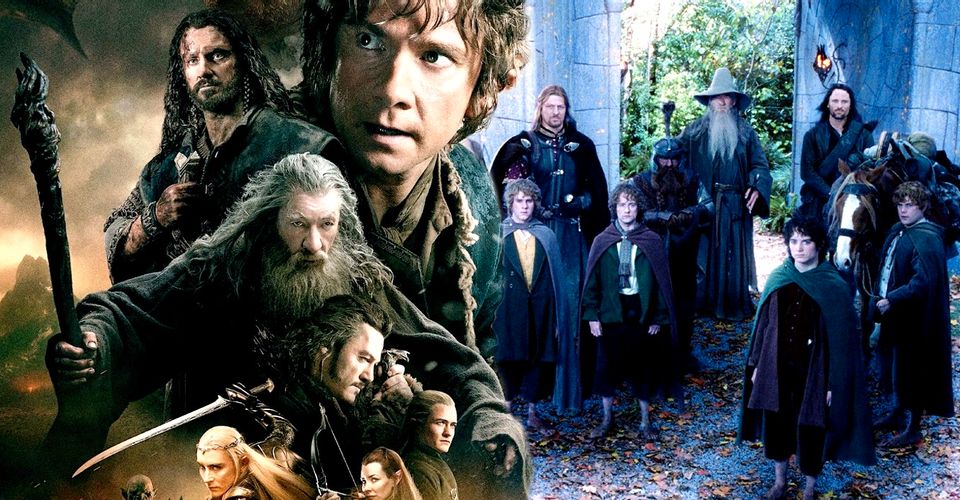Lord Of The Rings Movie Rights Explained (& Why A New Film Could Happen)

What’s happening with Tolkien’s Lord of the Rings movie rights, why are they for sale, and does this mean Middle-earth could return to the big screen sooner rather than later? The tale behind Lord of the Rings‘ legal rights is almost as long and convoluted as J.R.R. Tolkien’s Middle-earth mythology itself. From misunderstood animations to big-budget blockbusters, tabletop strategy to MMORPGs, and Second Age streaming to second-rate musicals, The Lord of the Rings is a franchise with a far-reaching presence across the world.
Alas, the rights to Tolkien’s work are far from straightforward, with different companies holding different privileges, and those privileges changing hands more often than Gollum changes personality. The situation has become more complex in recent years, as a plethora of Lord of the Rings projects entered development within a relatively short period, including Amazon’s Lord of the Rings: The Rings of Power, and New Line’s Lord of the Rings: The War of the Rohirrim.
The latest twist in the everlasting Tolkien rights saga sees a chunk of the author’s IP put up for sale – a chunk that includes permission to make more Middle-earth movie magic after Peter Jackson’s The Two Trilogies. Here’s a breakdown of Lord of the Rings‘ current legal landscape, and what that means for the franchise’s big screen future.
Lord Of The Rights: A Brief History

The Hobbit (1937) and The Lord of the Rings (1954-1955) brought J.R.R. Tolkien considerable literary success, leaving the author various suitors vying for the rights to adapt his books. In 1969, Tolkien struck a deal with United Artists – one of the biggest studios of its time – for a sum most would consider an inaccurate reflection of the investment’s value, reportedly because Tolkien needed the money to pay a tax bill. United Artists made a brief attempt at producing a Lord of the Rings movie in 1970, but quickly decided otherwise, and sold their rights to Saul Zaentz Company in 1976. This included exclusivity of movies, theater, merchandise, and more.
Zaentz founded Tolkien Enterprises (now known as Middle-earth Enterprises), and mostly became an intermediary, licensing various aspects of Tolkien’s property to third parties. So, when Rankin & Bass made their animated version of The Hobbit in 1977, they obtained the license from Tolkien Enterprises, while tabletop role-playing games such as War of the Ring were licensed to companies the same way. Zaentz produce Ralph Bakshi’s animated Lord of the Rings adaptation in 1978, but when Peter Jackson began casting his eye over Middle-earth in the late 1990s, the director approached New Line Cinema, who obtained the necessary rights for a live-action movie trilogy from Zaentz and his Tolkien Enterprises company.
Despite Zaentz holding most of the copyright cards, J.R.R. Tolkien’s estate (led by his son, Christopher, until 2017) retained certain elements of Lord of the Rings‘ licensing – most notably the ability to produce TV shows of 8 episodes or more. Hence, Amazon’s upcoming Lord of the Rings: The Rings of Power was licensed directly by the Tolkien Estate, not Zaentz. The rights Zaentz purchased in 1976 also centered upon The Hobbit and The Lord of the Rings specifically, which means works such as The Silmarillion remain largely controlled by the Tolkien Estate (albeit with a “matching rights” caveat for Zaentz Co.)
Which Lord Of The Rings Rights Are Being Sold (& Why Now?)

Essentially, everything Saul Zaentz Company bought from United Artists in 1976 is now up for grabs – albeit for more gold than you can shake a Smaug at. Saul Zaentz himself passed away in 2014 and, as per the original report from Variety, the late producer’s company is now selling its Tolkien-based interests, projected to fetch somewhere in the region of $2 billion.
The Silmarils in this deal’s crown are the movie rights to The Lord of the Rings and The Hobbit. Middle-earth hasn’t visited theaters since The Battle of Five Armies in 2014, but whomever purchases the IP from Zaentz would hold that power like Sauron wielding his newly-forged One Ring. The other major attraction of Zaentz Co.’s sale package is the Lord of the Rings video game rights. Middle-earth has, unsurprisingly, proven a fruitful realm for digital exploration in recent years, with major hits such as Middle-earth: Shadow of Mordor produced by Warner Bros. Indeed, Lord of the Rings movies and video games were both licensed to Warner Bros. until recently, since the studio not only owns New Line Cinema (which released Peter Jackson’s pair of trilogies between 2001 and 2014), but was also granted Lord of the Rings‘ video game exclusivity in 2009 following the expiration of Electronic Arts’ license.
According to the initial Variety report, Zaentz’s Tolkien fire-sale is happening now because the company believes Warner Bros. relinquished its movie rights in 2021 through inactivity. To prevent companies buying up properties simply to sit on them, licensing deals often stipulate that rights revert to their original owner after a specified period laying dormant (e.g. Sony makes Spider-Man movies with such regularity because Peter Parker swings straight back to Marvel otherwise). Zaentz Co.’s position is that Lord of the Rings no longer comes under license with Warner Bros., and Tolkien movie rights can now be included in its big sale. Whether Warner Bros. shares that viewpoint (especially with Lord of the Rings: War of the Rohirrim in production) could potentially pose a legal stumbling block. Of course, the Zaentz sale is likely motivated in part by the renewed interest Amazon’s The Rings of Power is generating.
Will New Lord Of The Rings Movies Actually Happen?

Because Tolkien’s IP is so fragmented, the sale of Middle-earth Enterprises’ rights is unlikely to be straightforward, nor especially quick. There are hurdles to overcome – especially with regards to who currently owns what – and objections may be raised by the Tolkien Estate, given previous lawsuits filed between parties over the years. Nevertheless, Saul Zaentz Co. selling the Tolkien rights it held for over 40 years is undeniably a very big deal, and when the dust settles, Frodo and co. will have a new home. Exactly where that home will be is the all-important question.
Amazon is certainly the early front-runner. Jeff Bezos has the cash, and Prime Video already holds a stake in Middle-earth content with Lord of the Rings: The Rings of Power. Amazon’s big-budget Middle-earth TV series also risks being undermined if a rival studio purchases Zaentz’s rights, then begins pumping out Lord of the Rings material of its own. Should Amazon stump up the gold, Prime Video could expand its Middle-earth franchise exponentially, with The Rings of Power becoming the first chapter in a sprawling Tolkien universe that encompasses movies, TV, video games, and more. Having established a strong working relationship with the Tolkien Estate, purchasing Zaentz’s rights would arguably give Amazon more influence over the future of Middle-earth than Eru himself.
Warner Bros. is the other obvious contender. Having made plenty of money from its Lord of the Rings and The Hobbit movies, WB knows the value of Tolkien’s fictional world, and purchasing Zaentz’s interests outright rather than obtaining a license would offer far greater freedom. Amazon could then stick to TV content, while Warner takes the Hobbits to Hollywood. Surprise suitors may yet emerge too, with the likes of Disney possessing means to pay. Busily acquiring valuable franchises such as the MCU and Star Wars over the past decade. It would be unwise to rule Disney out of the Lord of the Rings picture.
Whoever winds up owning Lord of the Rings‘ movie and video game rights, they’ll pay a hefty sum for the privilege. Inevitably, the new owner will then seek to recoup their investment, and the only way to recoup an amount like $2 billion is through major releases. Consequently, new Lord of the Rings movies are a distinct possibility for the near future. Whether those take the form of remakes, sequels, spinoffs or revivals will be down to Middle-earth’s new live-action landlords to decide.
About The Author


















